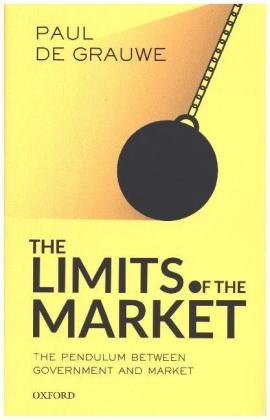Read more
The old discussion of 'Market or State' is obsolete. There will always have to be a mix of market and state. The only relevant question is what that mix should look like. How far do we have to let the market go its own way in order to create as much welfare as possible for everyone? What is the responsibility of the government in creating welfare? These are difficult questions. But they are also interesting questions and Paul De Grauwe analyses them in this book.
The desired mix of market and state is anything but easy to bring about. It is a difficult and sometimes destructive process that is constantly in motion. There are periods in history in which the market gains in importance. During other periods the opposite occurs and government is more dominant. The turning points in this pendulum swing typically seem to coincide with disruptive events that test the limits of market and state. Why we experience this dynamic is an important theme in the book.
Will the market, which today is afforded a greater and greater role due to globalization, run up against its limits? Or do the financial crisis and growing income inequality show that we have already reached those limits? Do we have to brace ourselves for a rejection of the capitalist system? Are we returning to an economy in which the government is running the show?
List of contents
- Preface
- 1: The Great Economic Pendulum
- 2: The Limits of Capitalism
- 3: External Limits of Capitalism
- 4: Internal Limits of Capitalism
- 5: The Utopia of Self-Regulation in the Market System
- 6: Who Can Save The Market System from Destruction?
- 7: External Limits of Governments
- 8: Internal Limits of Governments
- 9: Who is in Charge? Market or Government?
- 10: Rise and Fall of Capitalism. Linear or Cyclical?
- 11: The Euro is a Threat to the Market System
- 12: The World of Piketty
- 13: Pendulum Swings between Markets and Governments
About the author
Paul De Grauwe is Professor at the London School of Economics. He was a member of the Belgian parliament from 1991 to 2003. He is honorary doctor of the University of Sankt Gallen, the University of Turku, the University of Genoa, and the University of Valencia. He has been a visiting professor at various universities including Paris, Amsterdam, Berlin, Kiel, Milan, Pennsylvania, and Michigan. He obtained his PhD from the Johns Hopkins University in 1974. His research interests are in the economics of monetary unions and behavioural macroeconomics. His book publications include The Economics of Monetary Union (Oxford University Press, 11e, 2016) and Lectures on Behavioral Macroeconomics (Princeton University Press, 2012).
Summary
Paul De Grauwe examines why a healthy mix of market and state seems so difficult and analyses the internal and external limits of the market and the government, and the swing between these two points.
Additional text
In this lucid little book, De Grauwe, a Belgian economist now at the London School of Economics, explains why neither a pure market economy nor a purely government-controlled one is desirable. Getting the balance between market and government is extremely difficult. In practice, we lurch too far in one direction and then the other.
Report
The book is a concise and straightforward look into the application of modern capitalism, its esoteric contradictions that threaten to tear it apart, and its relationship with government... Aside from the effective analysis, a major advantage of the bookis the explanatory narrative that the author utilizes, with minimal references, making it accessible to both academic and non-academic audiences Alexandros Kyriakidis, JMCS

